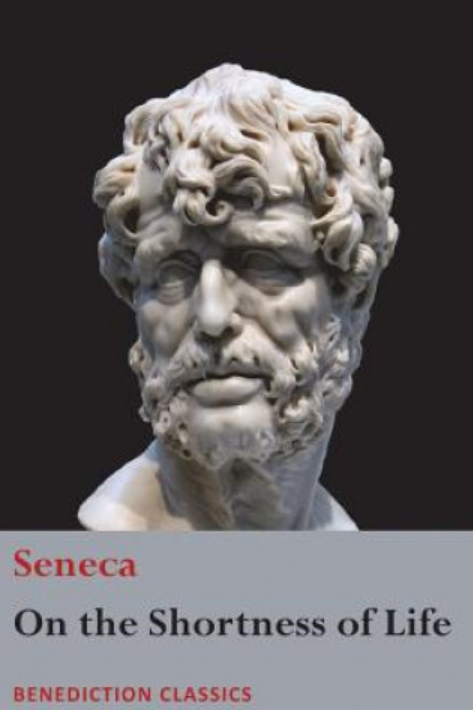If you are interested in self-improvement, self-awareness, and understanding the philosophical meaning of life and happiness, you will enjoy this book. On the Shortness of Life by Seneca is an essay written by Lucius Annaeus Seneca, in 49 AD, to his father-in-law, Paulinus.
As a philosopher, Seneca focuses this essay (i.e., a letter) to his father-in-law, on the nature and value of time, and how a great deal of time is often wasted on meaningless and trivial pursuits. As the title of this book indicates, life is simply too short for wasting time.
On the Shortness of Life Summary
This book, On the Shortness of Life by Seneca, offers interesting philosophical insight into choices you or I might make in our daily lives.
For instance, you can either be frugal, or wasteful of your time here on earth. Seneca’s writing encourages you to think about your own ability, or tendency, to use your time wisely, and teaches you how (and why) you should cherish every moment in time.
The author contrasts the decision you might make to deny someone the use of your personal property. Although, you probably would think nothing of wasting an entire day doing something you really don’t want to do. How much time do you spend actually living your life and doing the things you enjoy?
If you knew how much (or how little) time you have on this earth, how differently would you “spend” your time? Would you waste an afternoon binge-watching a television show? Does what you do everyday improve your life or is it based on what you believe the future holds?
Do you value your time, like you value your most prized possessions, or do you give it away for free, squandering it on meaningless and unproductive activities?
On the Shortness of Life by Seneca will open your eyes to the philosophy of time as something of value, teaching you to value time as you value money, your family and friends, and your life. Time and life, after all, are similar concepts, and this book will help you to place a value on your limited time, with mindfulness and purpose.
Best ideas from the On the Shortness of Life Summarized
The Value of Time
Seneca’s philosophy about the value of time is both simple and sophisticated. The value you put on your time should be just as important as the value you put on your life, your family and friends, and your most prized possessions and money.
You wouldn’t throw your money out the window, or into the street, so why would you waste your time as if there were an endless supply. Time doesn’t grow on trees anymore than money does, so treat your time as if it were as valuable as money, and as precious as your life, and your family. It has been said that “time is money,” but Seneca believed that time is more valuable than money.
Wasting your time is like wasting your money (or worse). Seneca puts a value on time, and life, and allows no time for regret or worrying about what is already done. You cannot change the past, or foresee the future. The most valuable time you have is now, so you should live as if time is running out; being frugal and deliberate in the allocation and distribution of your time. Spend your time as wisely and conservatively as you might spend your diminishing supply of money at the end of the month.
Awareness and Procrastination
Awareness is a central focus of Seneca’s view of life, and the value of time. This book, On the Shortness of Life by Seneca, will teach you how to stay focused on what matters. You cannot enjoy the time you may have in the future if you put off that which makes you happiest. You will always want more time for leisure, according to Seneca, but you will never take the time to truly enjoy it.
The author discusses procrastination as well. There may be anxiety over tomorrow, but if you put things off until tomorrow, he reminds you that life is a succession of never-ending engrossments and obligations. The time is now to make those changes that will improve your life in positive ways.
There is no time like the present to make your tomorrow better for you and those who matter to you.
Dying to Live, or Living to Die?
According to Seneca, learning how to die is as important as learning how to live. If you spend all of your time trying to avoid the inevitability of death, you will miss the most important part of life; living it.
If you learn to embrace your immortality, and appreciate the limited time you have here on earth, then you are sure to use your time to live as if dying could happen tomorrow.
You can live more purposefully, making decisions and taking action to optimize the time you have. According to Seneca, “…learning how to live takes a whole life, and, which may surprise you more, it takes a whole life to learn how to die.”
Every day that you have will come, and every day will go. What is most important is what you do with every day that you are given. The time you have is now, which is all you will ever know for sure.
This essay was written many years ago, but the author’s philosophical views are just as relevant today. You will enjoy this book if you want to make the most of your time on this earth. If you want to remain positive, and thoughtful, or work on self-improvement, or know someone in your life who does, you cannot go wrong with this short read. If happiness, reflection, and self-awareness interest you, then you will benefit from taking the time to read this book, However, you may not like this book if you are not open to introspection, self-awareness, or self-improvement.
This book, On the Shortness of Life by Seneca, will inspire you, motivate you, and stimulate your mind. You will gain insight into the author’s views on the value of time, as you develop the self-awareness and introspection needed to live a more productive and meaningful life.
This book will encourage you to consider your values, develop a code of ethics, and learn to appreciate life in the present. This book is a great read, and can easily be read over again, as needed.
Should you read the complete book?
Should you read the complete book? Absolutely. You will find the inspirational message on the value of time, both intriguing and insightful, as it pertains to the shortness of life. You will enjoy the author’s unique insight into learning how to live, and die, with honor, integrity, and values, while making the most of every minute, of every day.
Purchase this short read as a reminder of how valuable and precious your life, and your time, truly are. Today, of course, is here, but no one knows for certain if tomorrow will ever come. This is the shortness of life.


